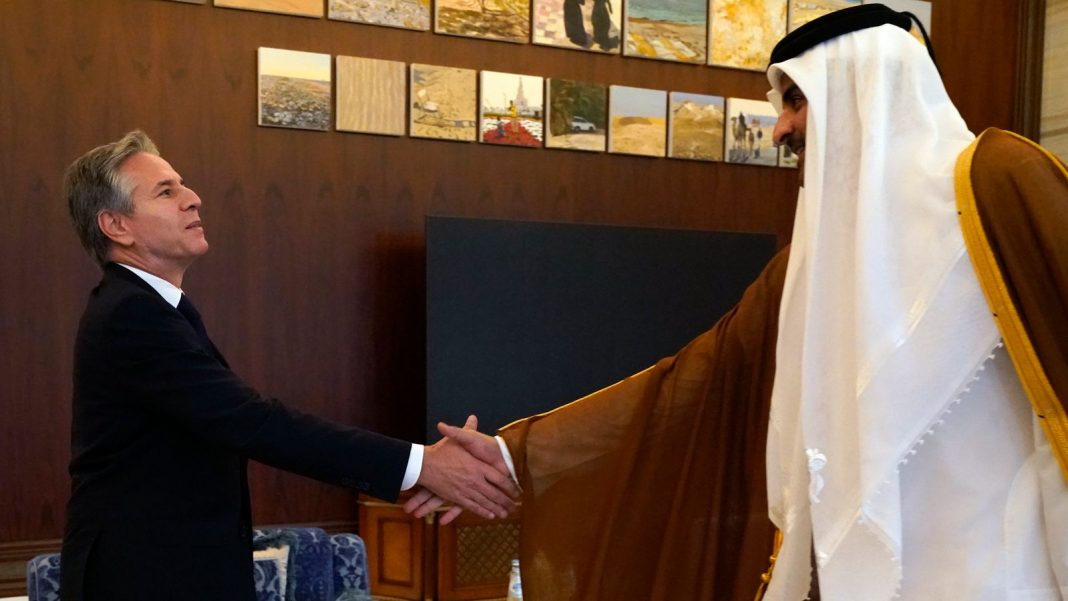Hamas’s barbaric attack on southern Israel and the coming ground offensive in Gaza has upended relations in other strategically vital parts of the Middle East – the oil rich kingdoms of the Gulf.
But it’s the tiny Gulf state of Qatar that may end up playing an outsized role in negotiating a way out of this latest bloody quagmire.
Over the years, Qatar has hosted political offices for various groups the West regards as terrorist organisations: including Hamas, the Afghan Taliban, and Egypt’s Muslim Brotherhood.
Israel-Hamas latest: Gaza to face assault by ‘land, air and sea’
It’s also home to the former head of Hamas’s political bureau in exile, Khaled Meshaal.
On Friday, Mr Meshaal called for the Muslim world to protest in support of Palestinians, singling out those countries with large populations of Palestinian refugees.
“Tribes of Jordan, sons of Jordan… This is a moment of truth and the borders are closed to you, you all know your responsibilities,” Mr Meshaal said.
Please use Chrome browser for a more accessible video player
2:57
Israel’s festival attack explained
On the same day, US secretary of state Antony Blinken stopped in Qatar’s capital Doha as part of his Middle East diplomatic offensive to shore up support for Israel and issue a note of caution regarding Israel’s bombardment of Gaza.
While there, he met with Qatar’s emir, Sheikh Tamim bin Hamad al Thani.
“Israel has both the right and even the obligation to defend its people… At the same time, the way Israel does this matters,” Mr Blinken said.
“And, to that end, I’ve discussed with the Israelis – urged the Israelis – to use every possible precaution to avoid harm to civilians.”

Iran’s foreign minister, Hossein Amir Abdollahian, meets with Palestinian group Hamas’s top leader, Ismail Haniyeh, in Doha
Qatar’s tightrope
Qatar is walking a tightrope on the issue of Hamas.
In Western capitals, Hamas’s terror attack on Israel is justification for the war now unleashed on Gaza.
Publicly, Qatar’s close connections with Hamas do not sit easily with the West. At the same time, the desert kingdom is a useful conduit for Western countries to do backdoor deals with non-state actors. It talks to the groups that other governments won’t sit down with.
Qatar is also home to the largest US military base in the Middle East.
Its ambitious foreign policy plays all sides and gives this small nation a seat at the table on the world’s most important geopolitical issues. The Israel-Hamas war is no exception.
Still, it’s complicated. Qatar has supported Hamas.
In 2012, Qatar’s previous emir, Sheikh Hamad bin Khalifa al Thani, became the first Arab leader in years to visit the besieged Gaza Strip, travelling there with his wife Sheikha Mozah.
The visit conferred legitimacy on the ironclad rule of Hamas over Gazans and demonstrated the Gulf state’s growing influence in the region.
The emir entered through Egypt’s Rafah border crossing to crowds of cheering Palestinians and brought millions of dollars in aid.
Like other Muslim-majority countries, the sympathy of Qataris will lie with the people of Gaza.

Qatar’s prime minister and foreign minister Mohammed bin Abdulrahman al Thani meets with Iranian foreign minister Hossein Amirabdollahian
Exerting its influence
Now Qatar will be under pressure from the US to exert its influence on Hamas to release Israeli hostages.
This is one area where the Gulf kingdom has form.
In 2017, during the height of the Syrian civil war, Qatar negotiated a complicated deal to release hostages in Iraq, some of whom were members of Qatar’s ruling al Thani family, reportedly in exchange for tens of millions of dollars paid to an Iraqi militia.
Two years later Qatar facilitated the release of two Western hostages taken by the Taliban in Afghanistan.
Read more:
Britain’s trapped at Egypt’s border
Couple’s desperate last messages to each other
‘This Jew stands with Gaza’
This year, Qatar has been mediating a prisoner swap deal between Iran and the US.
If you need a hostage deal done, go to Qatar. The US knows that.
On Friday, Qatar’s prime minister, Mohammed bin Abdulrahman al Thani, said: “Qatar’s diplomatic priorities are to achieve an immediate ceasefire, protect civilians, ensure the release of prisoners, and work towards limiting the expansion of violence and the cycle of conflict in the region, which will inevitably result in serious consequences.”
This content is provided by Spreaker, which may be using cookies and other technologies.
To show you this content, we need your permission to use cookies.
You can use the buttons below to amend your preferences to enable Spreaker cookies or to allow those cookies just once.
You can change your settings at any time via the Privacy Options.
Unfortunately we have been unable to verify if you have consented to Spreaker cookies.
To view this content you can use the button below to allow Spreaker cookies for this session only.
Click to subscribe to the Sky News Daily wherever you get your podcasts
Qatar’s foreign ministry confirmed it is involved in negotiating the release of Israeli hostages.
But without a break in the bombing, any deal will be impossible to realise.







